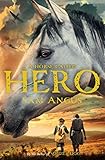
Price: £6.99
Publisher: Macmillan Children's Books
Genre: Fiction
Age Range: 10-14 Middle/Secondary
Length: 280pp
Buy the Book
A Horse called Hero
Sam Angus has again taken facts about a facet of war and woven them into a very successful story. Her debut novel, Soldier Dog, was short-listed for several prizes and in this new book she has shown that she is not a one book writer.
The Second World War is the background to this story. Dodo and Wolfie’s mother is dead and their father, who the Victoria Cross in the First World War, is missing after Dunkirk. The children are evacuated to Dulverton on Exmoor, and then discover that the father they hero-worship is to be court-martialled for desertion. In the midst of this horror for the children, Wolfie rescues a new born foal he calls Hero after his father and raises him with the help of schoolteacher Hettie Lamb, who takes the children in. Local people and the children at school ostracise Dodo and Wofie because of their father’s supposed misdeed, but Hettie and her father, the local vicar sustain them through some very dark days. The children endure the awful publicity of the court martial and a terrifying ordeal in the bog (shades of Lorna Doone!), but the final straw is the loss of Hero and Hettie’s Exmoor ponies to a gang stealing them, possibly for meat. Wolfie is devastated, Pa is still in prison, Father Lamb dies and Hettie and the children move to North East England to a mining community.
The massacre at Wormhout, scene of Pa’s supposed desertion, took place in 1940 giving historical background to the children’s ordeal. The fevered atmosphere of a small community during war-time is well drawn, as are the minor characters, Father Lamb, and Ned Jarvis, caught in a web of stealing amid pressure from a lawless family. But it is Wolfie and the horse Hero who leap from the pages and with whom many readers will identify. Despite some purple passages and a Hollywood style ending, this story captures the time and feel of a country at war.
The author’s love of the countryside is shown in her descriptions of Exmoor and the ponies who inhabit it, and this feel for the landscape plays an important factor in the craft of an historical novelist who relies on place to give the story depth.



